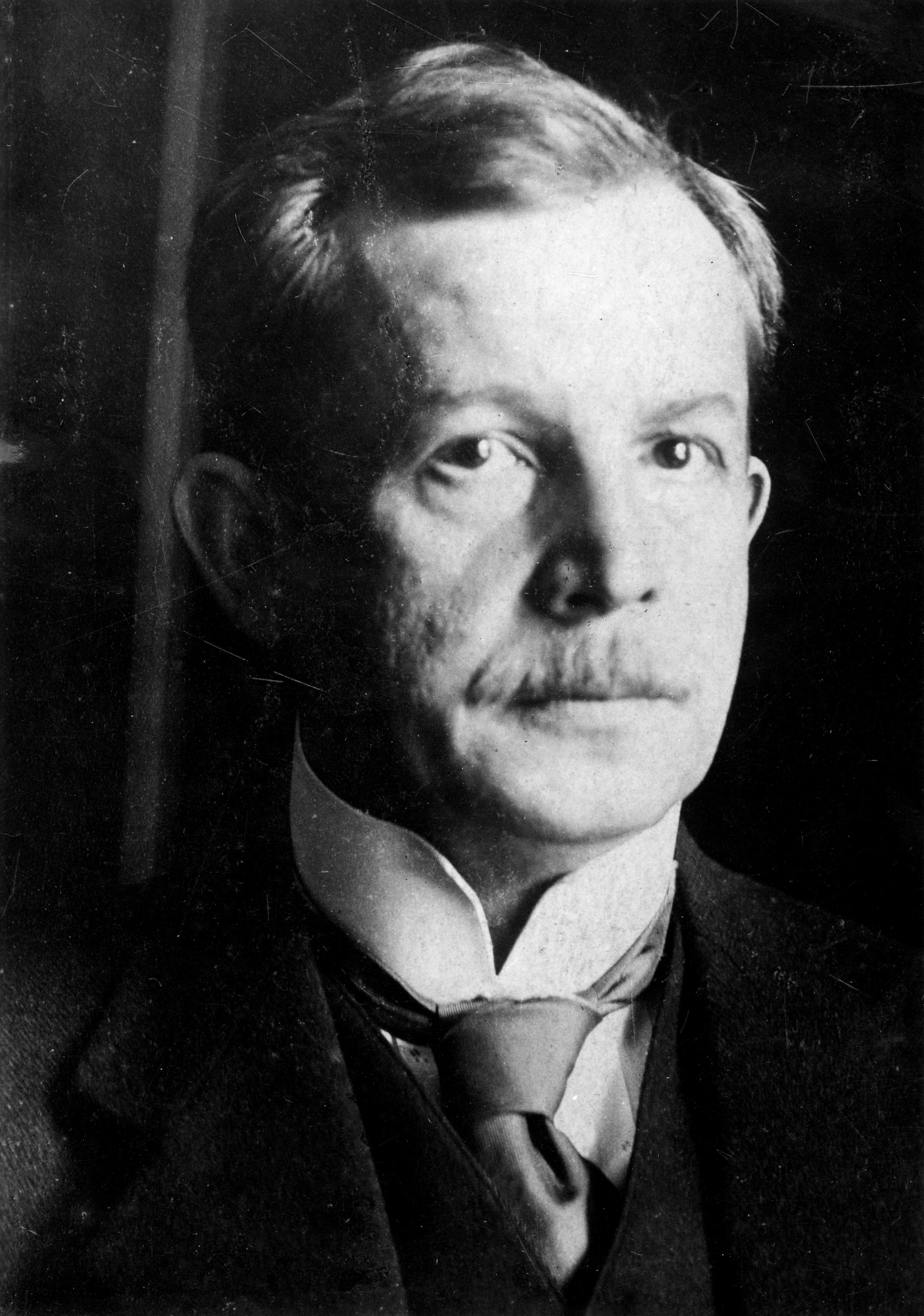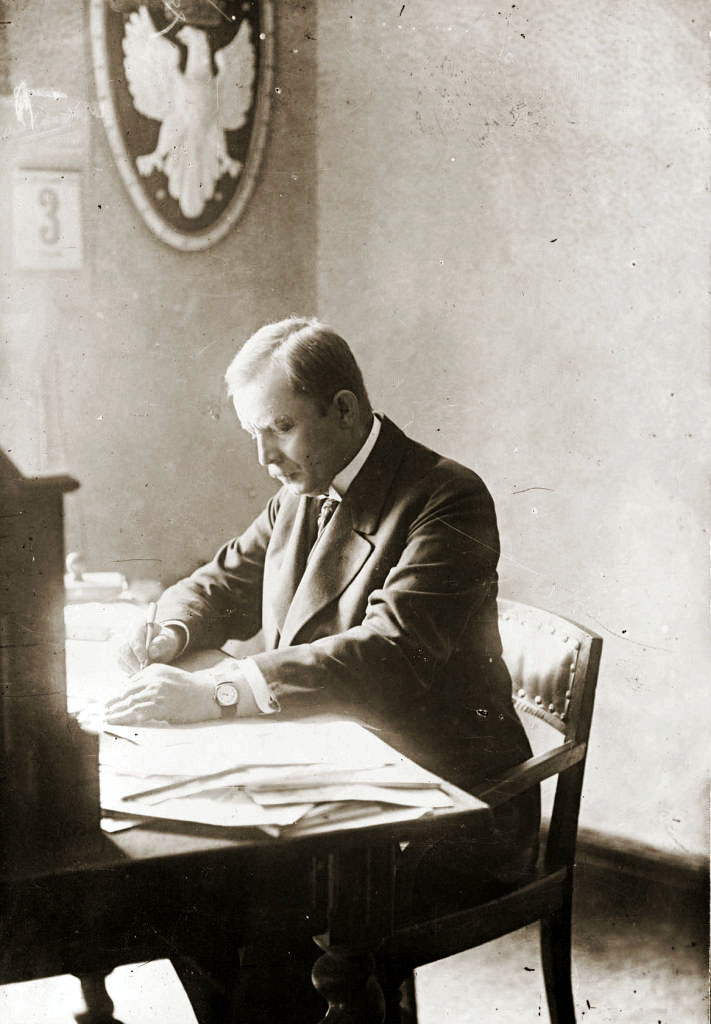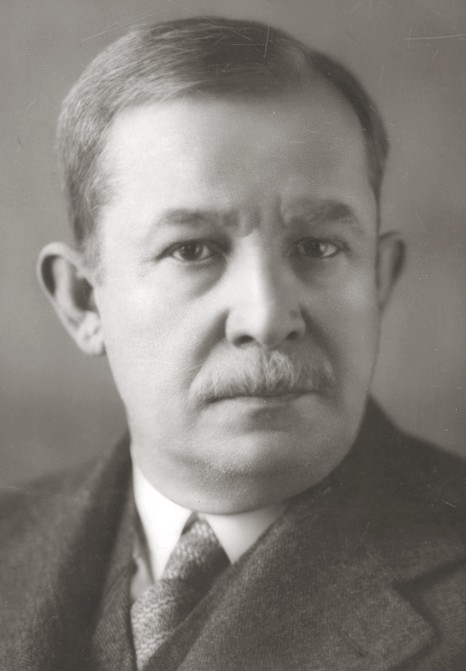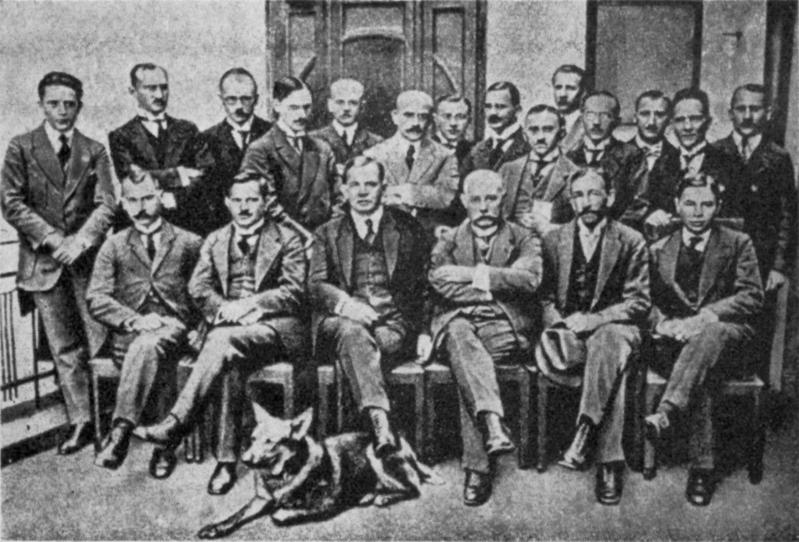‘Were it not for my efforts, Katowice would not be Polish today,’ said Wojciech Korfanty, one of the most prominent politicians of the interwar period. In the plebiscites and rankings conducted in Upper Silesia, Korfanty is ranked as one of the most eminent Silesians and people of the greatest merit for the region. The year 2009, which marked the 70th anniversary of his death, was celebrated in the province as the Year of Korfanty. Since 1993, prizes in his name have been awarded by the Upper Silesian Association, a regional organisation promoting Silesian culture and tradition.
Korfanty’s overall political activity, however, goes beyond the region. This was honoured by the Sejm (parliament) of the Republic of Poland, among others, by declaring 2023 as the Year of Wojciech Korfanty.
Legendary politician
Wojciech Korfanty is a key figure of the first half of the 20th century, well known for fighting for Silesia’s Polish identity. He was the first politician to unequivocally proclaim the unity of Upper Silesia with the rest of the Polish lands and became a member of the German parliaments, the Reichstag and the Prussian Landtag. In Greater Poland, he was a member of the Supreme People’s Council – the political centre of the region. On behalf of the Polish Government, he headed the Polish Plebiscite Commissariat in Upper Silesia from 1919 to 1921, whose main objective was to win the votes of Upper Silesians for Poland. In May 1921, he led the Third Silesian Uprising as a dictator. He thus contributed significantly to the incorporation of the industrialised part of the Upper Silesian region into the Republic of Poland.
However, the influence and significance of Korfanty’s activities were not confined to the borders of Greater Poland. No less important was Korfanty’s role in the process of rebuilding the Republic of Poland after 1918, earning him the title of ‘one of the fathers of independent Poland’ among historians. Being a leading politician in the Silesian Voivodeship, Korfanty also gained a certain position on the national political scene. Ousted from power after the May coup in 1926, he became one of the leaders of the anti-Sanation opposition. Through the daily Polonia, which he published, he influenced public opinion not only in the Silesian Voivodship, but in the whole country.
Fate did not spare Korfanty being challenged in the last years of his life. The politician was forced to go into exile in Czechoslovakia, and on his return to the country in April 1939 he was arrested. He died shortly after leaving prison. Leaving behind the enduring legacy of a steadfast politician.
Educated in German schools, raised in the Polish spirit
Wojciech Korfanty (born Adalbert Korfanty) was born on 20 April 1873 in Siemianowice Śląskie into a family of miners. His mother taught him to read from Piotr Skarga’s Lives of the Saints, yet he still had to use a Polish-German dictionary when reading Poland’s epic tale, Pan Tadeusz. At the same time, however, his parents belonged to a typical group of nationally indifferent Upper Silesians who identified themselves by their connection to the region. Very talented and extremely intelligent and educated in German schools, but at some point he assumed a Polish identity. The young Korfanty was opposed to forced Germanisation and Chancellor Otto von Bismarck call for it.
Years later, the future politician recalled: ‘the credit for my national consciousness must be attributed to my hackneyed professors at the gymnasium in Katowice, who, by their vilification of everything Polish and Catholic, aroused in me a curiosity for the Polish book, from which I longed to find out what this vilified and humiliated nation, whose language I spoke in my family, was’.
Korfanty had already shown an active stance against Germanisation during his years spent at Katowice Royal Grammar School. According to historians’ testimonies, at that time the young Korfanty supposedly walked around with a big stick and a wolfhound, used to threaten his enemies. There he founded a secret circle aimed at spreading Polish culture and a knowledge of literature. He made contacts with activists from Greater Poland. He took part in pro-Polish meetings, during which he spoke negatively about the German Chancellor Bismarck, for which he was expelled from grammar school.
Korfanty was helped by Count Józef Kościelski, a Polish national activist with anti-Prussian views, a member of the Reichstag and a patron of culture and the arts. Thanks to him, in the winter of 1895, Korfanty began his studies at the polytechnic in Charlottenburg near Berlin as a free student. A year later he moved to the Faculty of Philosophy at the Friedrich Wilhelm University in Wrocław. Between 1897 and 1899 he worked as a tutor for the young Lithuanian landowner Zygmunt Jundziłło, accompanying him on his travels. After returning from his travels, he resumed his studies in Wrocław. Until May 1901 he studied law and economics here, and in May–August 1901, he moved to the University of Berlin. He ultimately did not complete his studies. In fact, this period marked the beginning of his intensified political activity.
‘Korfanty is a man of the future; if he toes the line, he will be a historical figure.’
‘In Berlin I fell into the circle of national youth – a new life had begun. I was intoxicated with national ideals’, he wrote years later about his stay as a student in the Reich. However, even here Korfanty was active in Polish organisations, including the Scientific Society of Polish Academics and the Union of Polish Youth. Although Korfanty’s political profile had not yet been formed.
He did not shy away from socialist circles. Social democrats and supporters of the National League had not yet become hostile political camps. In later years, however, he denied any links with socialists. During the ceremony to unveil the Adam Mickiewicz monument in Warsaw in 1898, he met the leaders of the National League – Zygmunt Balicki and Roman Dmowski. By then, he was already one of the leaders of the Polish academic community in Wrocław, and joined the National League shortly afterwards. It was then that the significant and, as it turns out, prophetic words of Roman Dmowski were uttered: ‘Korfanty is a man of the future; if he toes the line, he will be a historical figure.’
His strengthening attitude and increasing activities with a liberationist bent exposed Korfanty to the German authorities. In 1902, accused of inciting the population by publishing anti-German articles, he was sentenced to four months in prison. The incident, however, as it turned out, served to boost the popularity of the politician’s rising star.
Member of the Reichstag
At a convention of the League of Nations activists from the Prussian partition in Kraków in 1902, it was decided that Upper Silesia would field its own national list in the elections to the Reichstag (parliament of the Reich) and the Landtag (Prussian parliament). The uniqueness of the situation was that the national activists from the Prussian partition took into account Upper Silesia, which was not a partitioned area.
Running for this very constituency in the 1903 elections, Korfanty won a seat in the Reichstag by a margin of 675 votes. This victory was a political watershed in the history of Upper Silesia: Korfanty became the first politician to run successfully under unambiguously national Polish slogans. At the same time, he also became a deputy to the Prussian Landtag. He retained his parliamentary seat until 1918.
In October 1918 the defeat of the Central Powers was already certain. The gathering of members of the Reichstag in the Polish Circle, anticipating the imminent end of their mission, began the final phase of their activities. It culminated in a speech by Wojciech Korfanty.
The last speech
‘No statistical tricks will be able to change the fact that in West Prussia the left bank of the Vistula up to the Hel Peninsula is inhabited by an undoubtedly Polish population,’ said Korfanty in his speech on 25 October 1918.
Your Lordships, Mr Ledebourg explained to us here yesterday which parts of the country he thought should belong to Poland. Here I would like to confirm his data and declare that we do not want a single German district, but demand Polish districts of Upper Silesia, Middle Silesia, Poznan, Polish West Prussia and Polish districts of East Prussia. [...] It is a miraculous orchestration of God that the old Prussia, the old Russia and the old Austria will perish under the onslaught of national ideas against which these three states have committed the greatest crimes.
This was the last speech by a Polish MP in the Reichstag. Together with Korfanty, other members of the Polish Circle also resigned.
In the service of Upper Silesia
Despite a turbulent time in political life in Warsaw and later Poznań, Korfanty did not lose sight of Upper Silesia, whose nationality, contrary to Korfanty’s hopes, was not decided by the Treaty of Versailles, which ended the First World War. In the final Versailles Treaty, one provision set out that the question of Silesia’s national identity would be decided in a plebiscite among the residents of the region. Both Poles and Germans appointed their plebiscite commissariats, responsible for the electoral campaign and its organisation. The Polish one was headed by Wojciech Korfanty. Despite different attitudes towards him, Korfanty managed to overcome animosities and unite the Polish forces in the region.
The summer of 1920, however, was marked above all by the events of the Second Silesian Uprising. Unlike the spontaneous uprising of the Polish population to join the region to Poland, it was the response of the Polish military and plebiscite organisations to the anti-Polish German actions before the plebiscite that was soon to take place there. The order to fight was issued on 19 August 1920. The uprising ended on 28 August on the orders of its commanders. On 20 March 1921, the plebiscite mandated by the Versailles Treaty took place. Nearly 97.5% of eligible voters cast their votes: 40.3% of them favoured joining Poland, while 59.4% voted for Upper Silesia to become a part of Germany. This meant that almost the entire plebiscite area fell to the Germans.
The response to the plebiscite result was the Third Silesian Uprising, which began on the night of 2/3 May. The uprising was again led by Korfanty, who – as an opponent of the politics of accomplished facts and armed settlements – after the first military successes gave the order to suspend military operations and wait for the decision of the Entente Commission. As a consequence of the 1922 uprising, the territory granted to Poland was enlarged by about one-third of the disputed territory (29% of the area and 46% of the population) with more than 75% of the coal mines and half of the metal works.
Imprisoned in the reborn Poland
In July 1921 Wojciech Korfanty left Silesia. Between 1922 and 1930, in the reborn Poland, he was a member of the Sejm for Christian Democracy (ChD). In a wave of euphoria over Poland taking over the part of Upper Silesia allocated to it, Korfanty’s candidacy for the post of prime minister was put forward. However, in the face of a protest from Head of State Józef Piłsudski and a threatened general strike by the PPS, he did not begin to form a government, and the committee withdrew his nomination. Only in the autumn of 1923 did he briefly become deputy prime minister in Wincenty Witos’s Government.
Defeated in Warsaw, Korfanty returned to Katowice, where, in addition to his political activities, he became heavily involved on the economy. The latter, however, as well as his property ownership, had an increasingly unfavourable effect on Korfanty’s public image. The politician and activist was frequently accused of deriving personal gain from state activities. Against the background of the attacks launched against him, Korfanty was helped by the fact that he had his own publishing house and its associated press organ, the daily Polonia. The publishing house not only profitted him financially, it also became an effective tool for influencing public opinion. In terms of the breadth and modernity of the publishing techniques used, however, it was one of the best newspapers in the republic at that time. This favourable situation came to an abrupt end with the outbreak of the May Coup in 1926 and Józef Piłsudski’s assumption to power in Poland.
In 1930 Korfanty was arrested and imprisoned in the Brest fortress together with other Centrolew deputies. After his release, he returned to Upper Silesia, where, however, the spectre of another arrest hung over him. Fearing repression, he left Poland for the capital of Czechoslovakia. He initially stayed with Wincenty Witos, from whose memoirs comes a more detailed description of Korfanty’s escape:
On 7 April, Senator Korfanty arrived in Rožnov in the evening. He said that he had escaped from Silesia before his arrest, having been warned by an official of the Katowice prosecutor’s office. He reached the border by car. He claimed that in a few minutes it would be too late.
‘I have to go back’
Korfanty’s emigration status deteriorated significantly in March 1939. This was because at that time the Wehrmacht occupied Czechoslovakia. This meant an immediate threat to Korfanty, who was living in Prague. At first he took refuge in the French embassy, then, with a French passport in the name of Albert Martin, he left for Paris. Efforts to obtain permission from the Polish authorities to return to the country were unsuccessful. But they did not discourage him either. On 27 April 1939, he arrived in Gdynia and from there Katowice.
However, in the country to which he so badly wanted to return, he was arrested and, despite the protests, imprisoned in Pawiak prison. He spent three months there. It was also during this time that the prisoner’s numerous ailments and conditions manifested themselves: liver disease, anaemia, inflammation of the gall bladder and pleurisy. These, as well as the fear of Korfanty’s death in custody, contributed to Korfanty’s release after 82 days. He died on 17 August 1939, on the 20th anniversary of the outbreak of the Silesian Uprising.
In a political testament in Polonia, he left this exhortation:
I utter a fervent plea to the Silesian people to remain faithful to Christian principles and to their attachment to Poland, to work and sacrifice without ceasing in order to make of Poland such a Poland as is worthy of our dreams. A great Poland, a strong Poland, a Catholic Poland, a Poland of the rule of law, a Poland that is always just’.
***
Bibliography
Bebnik G., S. Rosenbaum and M. Węcki, Wojciech Korfanty, Warszawa 2020.
Lewandowski J.F., Wojciech Korfanty, Warszawa 2013.
Orzechowski M., Wojciech Korfanty. Biografia Polityczna, Wrocław-Warszawa-Kraków-Gdańsk 1978.
Skrzypek M., Wojciech Korfanty, Warszawa 2009.
Dzieje.pl: Wojciech Korfanty (1873-1939)
Polskieradio.pl: Wojciecha Korfantego kochały kobiety i Ślązacy



